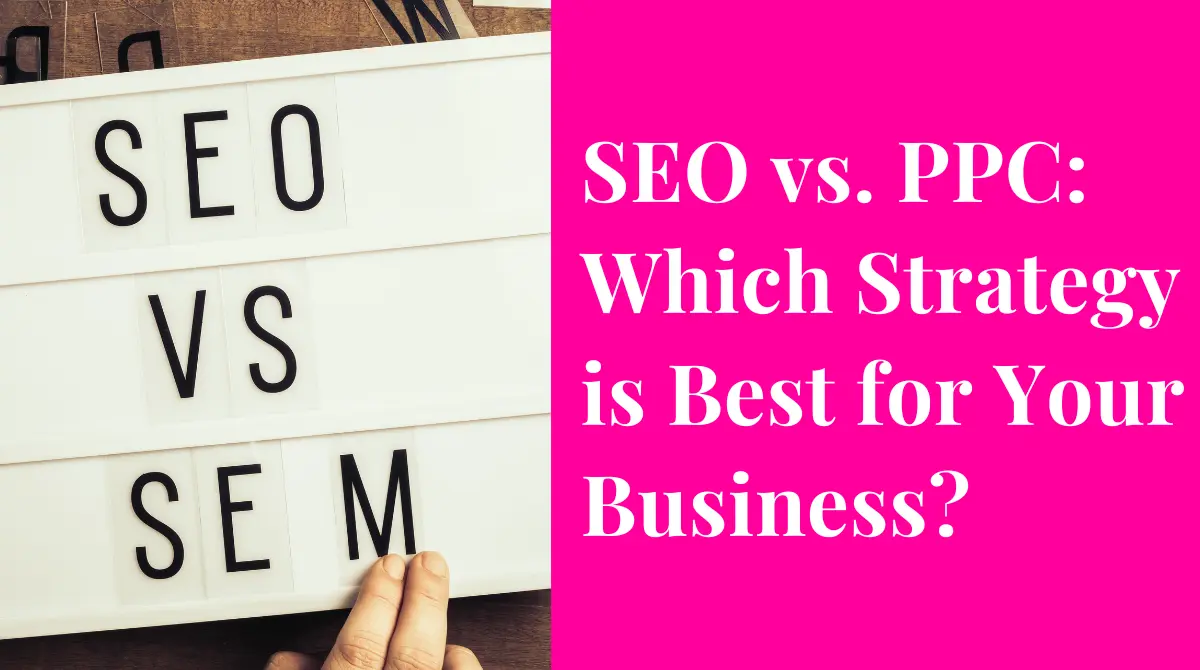In today’s fast-paced digital world, everything is available online—from everyday necessities to the most luxurious items. While this has made life easier for consumers, it has significantly increased competition for businesses.
Just having an online presence is no longer enough. To grow your business, you need to ensure that your product or service reaches the right audience, and that requires effort, time, and patience. According to research by Semrush, It is found that Over 70% of shoppers use their phones to buy online.
Now, you might be thinking, “This sounds challenging!” But don’t worry—this write-up will introduce you to two of the most effective digital marketing strategies: SEO (Search Engine Optimization) and PPC (Pay-Per-Click).
Search Engine Optimization focuses on improving your website’s organic ranking on search engines, offering long-term benefits but taking time to show results.
Pay-Per-Click service delivers immediate traffic by placing paid ads in search results. Choosing the right strategy depends on your business goals, budget, and timeline, with many businesses benefiting from a combination of both.
Each has its strengths and can help your business grow by targeting the right audience. So, how do you know which one is best for your business? Let’s break it down and explore how these strategies can drive results for you.
What Do You Know About SEO?
SEO stands for search engine optimization. It is a process of optimizing or refining your website to rank higher in search engine results. Search engines like Google, Bing, and more crawl through all the website pages and use multiple complex algorithms to categorize the pages based on known and unknown factors. This strategy is used to earn higher web traffic levels and improve the visibility of the site.
SEO Involves 4 main strategies to improve the presence of your website.
- Keyword Research: it is the method of understanding the words & phrases(Keywords) your target consumers use when searching on search engines.
- On-Page SEO: It is all about curating content searchers want to see. This includes figuring out why searchers are making the query. It is called search intent.
- Off-Page SEO: It is where you do things outside your site to show Google that your pages deserve to rank. It includes building backlinks and other activities.
- Technical SEO: Technical SEO ensures search engines can find, crawl & Index the content you have published.
What Is PPC?
PPC refers to pay-per-click. PPC is a type of online marketing where advertisers pay each time a user clicks on one of their ads. PPC is a way to buy visits to your website. The most common form of PPC advertising is through search engines like Google Ads where advertisers bid on keywords and their ads appear at the top of search engine result pages.
How The PPC Model Works?
The Pay Per Click service is based on keywords. Some of the popular marketing platforms are Google Ads, Facebook Ads, Microsoft Ads, YouTube Ads, LinkedIn Ads, Amazon Ads, and more.
- Ad Creation: Develop ad copy and visuals that are appealing and relevant to your audience.
- Bidding: Setting how much you’re willing to pay for a click or an impression. This can be a competitive process, especially for high-demand keywords.
- Targeting: PPC allows you to target specific demographics, locations, and even the time of day your ads will appear.
Comparing SEO and PPC
Comparing Costs
When accounting for the cost of SEO and PPC, both techniques have different models.
- SEO: The investment begins with Optimizing your website and creating high-quality content. Once you have achieved the goal of organic ranking, expenses will be less than paying for PPC ads. SEO demands consistent efforts over time, especially for competitive keywords.
- PPC: With Professional PPC Services, you pay for every click, which can add up quickly depending on your industry and the competitiveness of your keywords. While you can control your daily budget, PPC requires ongoing investment. Once you stop paying, the traffic stops.
Time To Watch Results
- SEO: Patience is key with SEO. It might take months to see significant results. However, You can expect long-run results once your site is ranked.
- PPC: PPC offers quick results. You can launch a campaign and start seeing traffic the same day. This makes PPC ideal for businesses looking to promote time-sensitive offers or gain immediate visibility.
Effectiveness of Different Business Goals
- Brand Awareness: Long-term brand awareness can be achieved through various SEO strategies. SEO will be effective in building your authority and trust over time as users become more familiar with your brand through organic searches.
- Lead Generation: PPC outshines SEO in generating quick leads. This technique precisely targets businesses to attract High-intent traffic from people actively searching for their products or services.
Factors To Consider
Deciding between SEO & PPC is a bit confusing. You have to look at multiple factors to make a sensible decision. Let’s have a look at the factors.
Identify Your Business Goals & Objectives
Before choosing any SEO or PPC agency, You need to know what is the main goal of your business. If you want to build a long-term online presence and authority SEO is the best solution. It is perfect for businesses that want to grow steadily over time.
However, if you are looking for quick sales or want to promote a specific product then PPC will be the right choice.
A PPC agency in Atlanta, for example, can help businesses drive traffic and generate leads in a short period.
Budget & Resources
SEO requires time, patience, and often a team of professionals to get it right. If you have a limited budget and need fast results, PPC might be more suitable.
Professional PPC services offer a great way to get immediate traffic, but the cost can rise quickly, especially in competitive industries.
Target Audience and Industry
Before opting for SEO or PPC, consider your target audience and industry. If it is a highly competitive industry, SEO might take longer to achieve organic ranking.
PPC gives you the ability to target your audience with precision. A PPC management agency can help fine-tune your campaigns to ensure you’re reaching the right people at the right time.
Combining SEO & PPC
Combining SEO and PPC offers the best of both worlds for your business. SEO provides long-term, sustainable growth by improving organic search rankings, while PPC delivers immediate visibility and targeted traffic. Together, they create a balanced strategy where PPC can drive quick results, and SEO ensures ongoing presence. This integrated approach allows businesses to maximize reach, boost conversions, and optimize overall marketing performance.
Final Thoughts
In the quest for SEO vs. PPC, there is no one-size-fits-all answer. Both techniques have their unique benefits. It all depends on various factors such as your business goals, budget, and target audience. For businesses looking for long-term growth and sustainability, SEO is the way to go. However, if immediate traffic and lead generation are your major concerns, invest in professional PPC services.
Frequently Asked Questions
Is SEO more cost-effective than PPC?
SEO tends to be more cost-effective in the long run since it brings organic traffic, but it requires time and effort to see results.
Can I use both SEO and PPC?
Combining both strategies can help you achieve long-term growth through SEO while gaining immediate traffic with PPC.
How quickly will I see results from PPC?
PPC can bring immediate results, often within hours of launching a campaign.





